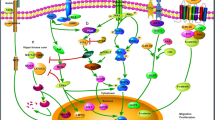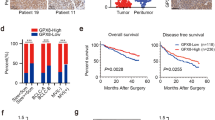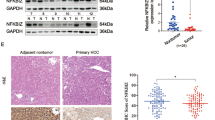Abstract
The tumor suppressor p53 is one of the most frequently mutated genes in hepatocellular carcinoma (HCC). Previous studies demonstrated that CP-31398 restored the native conformation of mutant p53 and trans-activated p53 downstream genes in tumor cells. However, the research on the application of CP-31398 to liver cancer has not been reported. Here, we investigated the effects of CP-31398 on the phenotype of HCC cells carrying p53 mutation. The effects of CP-31398 on the characteristic of p53-mutated HCC cells were evaluated through analyzing cell cycle, cell apoptosis, cell proliferation, and the expression of p53 downstream genes. In tumor xenografts developed by PLC/PRF/5 cells, the inhibition of tumor growth by CP-31398 was analyzed through gross morphology, growth curve, and the expression of p53-related genes. Firstly, we demonstrated that CP-31398 inhibited the growth of p53-mutated liver cancer cells in a dose-dependent and p53-dependent manner. Then, further study showed that CP-31398 re-activated wild-type p53 function in p53-mutated HCC cells, which resulted in inhibitive response of cell proliferation and an induction of cell-cycle arrest and apoptosis. Finally, in vivo data confirmed that CP-31398 blocked the growth of xenografts tumors through transactivation of p53-responsive downstream molecules. Our results demonstrated that CP-31398 induced desired phenotypic change of p53-mutated HCC cells in vitro and in vivo, which revealed that CP-31398 would be developed as a therapeutic candidate for HCC carrying p53 mutation.






Similar content being viewed by others
References
Jemal A, Bray F, Center MM, Ferlay J, Ward E, Forman D. Global cancer statistics. CA Cancer J Clin. 2011;61:69–90.
de Lope CR, Tremosini S, Forner A, Reig M, Bruix J. Management of hcc. J Hepatol. 2012;56 Suppl 1:S75–87.
Bruix J, Sherman M. Management of hepatocellular carcinoma: an update. Hepatology. 2011;53:1020–2.
Oren M, Rotter V. Mutant p53 gain-of-function in cancer. Cold Spring Harb Perspect Biol. 2010;2:a001107.
Goh AM, Coffill CR, Lane DP. The role of mutant p53 in human cancer. J Pathol. 2011;223:116–26.
Muller PA, Vousden KH. P53 mutations in cancer. Nat Cell Biol. 2013;15:2–8.
Rippin TM, Bykov VJ, Freund SM, Selivanova G, Wiman KG, Fersht AR. Characterization of the p53-rescue drug cp-31398 in vitro and in living cells. Oncogene. 2002;21:2119–29.
He X, Liu F, Yan J, Zhang Y, Shang H, Dou Q. Trans-splicing repair of mutant p53 suppresses the growth of hepatocellular carcinoma cells in vitro and in vivo. Sci Rep. 2015;5:8705.
He X, Liao J, Liu F, Yan J, Shang H, Dou Q, et al. Functional repair of p53 mutation in colorectal cancer cells using trans-splicing. Oncotarget. 2015;6:2034–45.
Sell S. Mouse models to study the interaction of risk factors for human liver cancer. Cancer Res. 2003;63:7553–62.
Aravalli RN, Steer CJ, Cressman EN. Molecular mechanisms of hepatocellular carcinoma. Hepatology. 2008;48:2047–63.
Liu J, Ma Q, Zhang M, Wang X, Zhang D, Li W, et al. Alterations of tp53 are associated with a poor outcome for patients with hepatocellular carcinoma: evidence from a systematic review and meta-analysis. Eur J Cancer. 2012;48:2328–38.
Bossi G, Sacchi A. Restoration of wild-type p53 function in human cancer: relevance for tumor therapy. Head Neck. 2007;29:272–84.
Lane DP, Cheok CF, Lain S. P53-based cancer therapy. Cold Spring Harb Perspect Biol. 2010;2:a001222.
North S, El-Ghissassi F, Pluquet O, Verhaegh G, Hainaut P. The cytoprotective aminothiol wr1065 activates p21waf-1 and down regulates cell cycle progression through a p53-dependent pathway. Oncogene. 2000;19:1206–14.
Bykov VJ, Issaeva N, Shilov A, Hultcrantz M, Pugacheva E, Chumakov P, et al. Restoration of the tumor suppressor function to mutant p53 by a low-molecular-weight compound. Nat Med. 2002;8:282–8.
Peng Y, Li C, Chen L, Sebti S, Chen J. Rescue of mutant p53 transcription function by ellipticine. Oncogene. 2003;22:4478–87.
Demma MJ, Wong S, Maxwell E, Dasmahapatra B. Cp-31398 restores DNA-binding activity to mutant p53 in vitro but does not affect p53 homologs p63 and p73. J Biol Chem. 2004;279:45887–96.
Issaeva N, Bozko P, Enge M, Protopopova M, Verhoef LG, Masucci M, et al. Small molecule rita binds to p53, blocks p53-hdm-2 interaction and activates p53 function in tumors. Nat Med. 2004;10:1321–8.
Zache N, Lambert JM, Rokaeus N, Shen J, Hainaut P, Bergman J, et al. Mutant p53 targeting by the low molecular weight compound stima-1. Mol Oncol. 2008;2:70–80.
Yu X, Vazquez A, Levine AJ, Carpizo DR. Allele-specific p53 mutant reactivation. Cancer Cell. 2012;21:614–25.
Fiorini C, Menegazzi M, Padroni C, Dando I, Dalla Pozza E, Gregorelli A, et al. Autophagy induced by p53-reactivating molecules protects pancreatic cancer cells from apoptosis. Apoptosis Int J Prog Cell Death. 2013;18:337–46.
Rao CV, Patlolla JM, Qian L, Zhang Y, Brewer M, Mohammed A, et al. Chemopreventive effects of the p53-modulating agents cp-31398 and prima-1 in tobacco carcinogen-induced lung tumorigenesis in a/j mice. Neoplasia. 2013;15:1018–27.
Takimoto R, Wang W, Dicker DT, Rastinejad F, Lyssikatos J, el-Deiry WS. The mutant p53-conformation modifying drug, cp-31398, can induce apoptosis of human cancer cells and can stabilize wild-type p53 protein. Cancer Biol Ther. 2002;1:47–55.
Tang X, Zhu Y, Han L, Kim AL, Kopelovich L, Bickers DR, et al. Cp-31398 restores mutant p53 tumor suppressor function and inhibits uvb-induced skin carcinogenesis in mice. J Clin Invest. 2007;117:3753–64.
Xu J, Timares L, Heilpern C, Weng Z, Li C, Xu H, et al. Targeting wild-type and mutant p53 with small molecule cp-31398 blocks the growth of rhabdomyosarcoma by inducing reactive oxygen species-dependent apoptosis. Cancer Res. 2010;70:6566–76.
He XX, Chang Y, Meng FY, Wang MY, Xie QH, Tang F, et al. Microrna-375 targets aeg-1 in hepatocellular carcinoma and suppresses liver cancer cell growth in vitro and in vivo. Oncogene. 2012;31:3357–69.
Wang Z, Liu F, Tu W, Chang Y, Yao J, Wu W, et al. Embryonic liver fodrin involved in hepatic stellate cell activation and formation of regenerative nodule in liver cirrhosis. J Cell Mol Med. 2012;16:118–28.
Wang Z, Song Y, Tu W, He X, Lin J, Liu F. Beta-2 spectrin is involved in hepatocyte proliferation through the interaction of tgfbeta/smad and pi3k/akt signalling. Liver Int Off J Int Assoc Stud Liver. 2012;32:1103–11.
He X, Kong X, Yan J, Zhang Y, Wu Q, Chang Y, et al. Cp-31398 prevents the growth of p53-mutated colorectal cancer cells in vitro and in vivo. Tumour Biol J Int Soc Oncodev Biol Med. 2015;36:1437–44.
Lehmann BD, Pietenpol JA. Targeting mutant p53 in human tumors. J Clin Oncol Off J Am Soc Clin Oncol. 2012;30:3648–50.
Guo J, Xin H. Chinese gene therapy. Splicing out the west? Science. 2006;314:1232–5.
Levesque AA, Eastman A. P53-based cancer therapies: is defective p53 the achilles heel of the tumor? Carcinogenesis. 2007;28:13–20.
Foster BA, Coffey HA, Morin MJ, Rastinejad F. Pharmacological rescue of mutant p53 conformation and function. Science. 1999;286:2507–10.
Wang W, Takimoto R, Rastinejad F, El-Deiry WS. Stabilization of p53 by cp-31398 inhibits ubiquitination without altering phosphorylation at serine 15 or 20 or mdm2 binding. Mol Cell Biol. 2003;23:2171–81.
Roh JL, Kang SK, Minn I, Califano JA, Sidransky D, Koch WM. P53-reactivating small molecules induce apoptosis and enhance chemotherapeutic cytotoxicity in head and neck squamous cell carcinoma. Oral Oncol. 2011;47:8–15.
Acknowledgments
This work was supported by the National Natural Science Foundation of China (No.81072003, 81270506, 81472832) and the Outstanding Youth Science Foundation of Tongji Hospital (No. YXQN005).
Conflicts of interest
None
Author information
Authors and Affiliations
Corresponding author
Rights and permissions
About this article
Cite this article
He, XX., Zhang, YN., Yan, JW. et al. CP-31398 inhibits the growth of p53-mutated liver cancer cells in vitro and in vivo. Tumor Biol. 37, 807–815 (2016). https://doi.org/10.1007/s13277-015-3857-5
Received:
Accepted:
Published:
Issue Date:
DOI: https://doi.org/10.1007/s13277-015-3857-5




